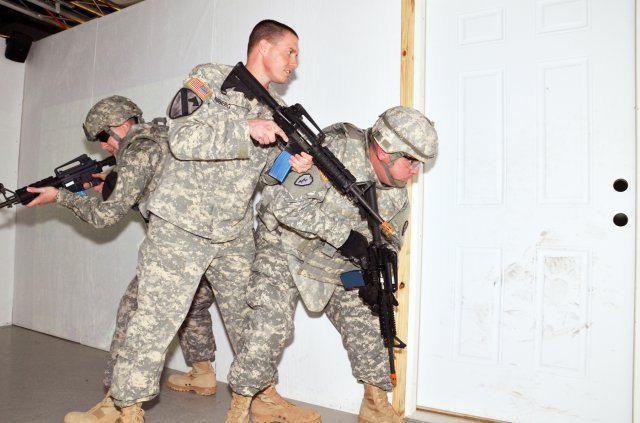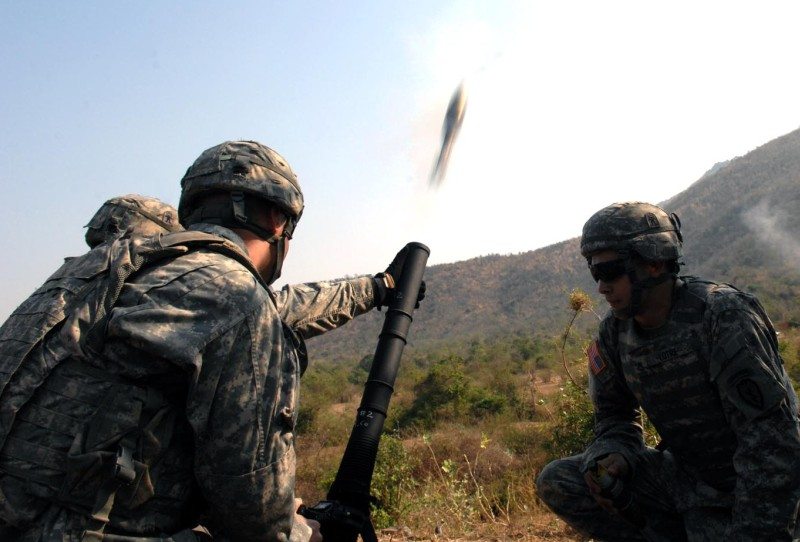Soldiers recovering from Traumatic Brain Injury had the chance to see if they were ready to get “back to the fight” during simulated combat skills training held March 9 at the Warrior Skills Training Center here.
They were the first Traumatic Brain Injury, known as TBI, patients to go through simulation training as part of the Warrior Readiness Assessment program at Carl R. Darnall Army Medical Center’s Traumatic Brain Injury Clinic. Using a virtual environment, the Soldiers practiced warrior tasks such as conducting a convoy, clearing a room and weapons qualification.
“This type of simulated-environment training dealing specifically with combat tasks helps us assess the Soldiers’ ability to react under combat stress,” said Lt. Cmdr. Scott Mitchell, chief of the CRDAMC TBI Clinic. “Our goal in treating patients with TBI is for them to have a full or near-full recovery, and for Soldiers, that means going beyond normal life functions to help them be Soldier ready.”
Mitchell said that the simulation training helps the Soldiers determine what aspects were a challenge for them to do and to identify those key areas they need to improve upon. If a Soldier needs more help to overcome particular issues, the clinic can provide more individual therapy and counseling or more cognitive rehabilitation. Then, if determined necessary, the Soldier may run through the training again to reassess performance.
“The whole intent of the training is to reassure the Soldiers that even if they get injured, they are not broken, that they can get better. They can get back on-top of their game and get back to the fight,” he added.
Sgt. 1st Class Jeremy Ricketts said the training was the ideal way for him to gauge his readiness state.
“It was mind-blowing how realistic it was. The convoy scenarios on the digital screens put me right back in it. The terrain, how the enemy reacts, our actions — all of it was just like it is in real life. I found my head bobbing as if I was really driving over the hills,” he said.
The virtual scenario was eerily familiar to Ricketts, as he was injured in Iraq while pulling overwatch security of a four-vehicle convoy when a semi-truck slammed into his vehicle causing him severe injuries.
“It’s a great way for me to determine if I’m ready to return to duty and perform my job as before. The training showed me that I was doing some things I wasn’t even aware I was doing, and I can see now what I have to change or improve. It’s given me the confidence I need so I can get back to the fight,” he said.
Sgt. Michael Darby, noncommissioned officer-in-charge of the TBI clinic, added that this simulation training and other warrior tasks training is essential to ensure Soldiers can return to duty, capable of meeting the challenges and demands all Soldiers face.
“Most everything done in the Army requires a step-by-step process in order to accomplish the mission. In land navigation for instance, if you miss just one thing, it can throw you off by miles. This is a challenge for TBI patients who have trouble concentrating or remembering certain things,” Darby said. “It can be frustrating for the Soldiers as they have to struggle a bit more to do things that were like second nature to them before their trauma. It was heartening to see these Soldiers work through their frustration and continue the mission.”
In addition to the benefits of this type of warrior task training, Darby said the treatment plan as a whole for TBI patients is tremendously successful in helping them recover.
“I suffered two concussions in theater back when we first invaded Iraq. I know I would have had a speedier recovery if this type of comprehensive treatment plan was in place then,” he said.
All brain injuries, from mild to severe, if undetected and untreated, can seriously impact a person’s health, but are very treatable. According to Mitchell, the TBI clinic saw approximately 10,000 patient visits last year, and boasts a 98 percent return-to-duty rate.











